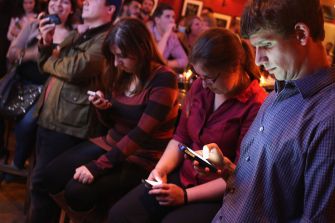Burned out by 24/7 Work Emails? France Has a Solution.

Something has to give.
Despite numerous predictions over the years that email would no longer be prevalent in our modern workplace, its frequency and ubiquity show little sign of death. According to a recent report on email statistics by the Silicon Valley research firm The Radicati Group, the average worker sent and received 122 emails a day in 2015. That number is expected to grow to 125 by the year 2019.
The accessibility of our work email has completely blurred the lines between work and leisure. When does the workday end if you are still responding to work emails? In fact, the problem of incessant emails after work hours and on the weekend has become so heightened that France recently recognized a workers’ “right to disconnect” from office emails.
Right to Disconnect

As part of sweeping new labor laws in France for 2017, French workers now have le droit de la déconnexion–the right to disconnect from work emails during non-work hours. The rule requires that companies with over 50 employees must negotiate an email policy regarding time off from checking and sending emails. While it does not directly ban after-hour emailing, it aims to promote a workplace conversation and agreement towards a more sustainable email policy.
According to the French Labor Code, Article L2242-8:
“The establishment by the company of regulations for the use of digital tools, in order to ensure the respect of rest time and vacation, as well as personal and family time.”
The Right to Disconnect’s focus on rest time derives from the European Union’s Working Time Directive, which requires a minimum daily rest period of 11 consecutive hours in every 24 hours. It is a recognition that the modern worker may be lacking adequate time in between the end of a workday and the start of the next. There is little time to recharge if you are always connected. Some of the recommendations related to the Right to Disconnect include educating employees about the impact of always being on, and a suggestion of email-free days.
An Electronic Leash?

Speaking to the BBC about why a Right to Disconnect may be necessary, parliament member Benoit Hamon stated:
“All the studies show there is far more work-related stress today than there used to be, and that the stress is constant. Employees physically leave the office, but they do not leave their work. They remain attached by a kind of electronic leash – like a dog. The texts, the messages, the emails – they colonize the life of the individual to the point where he or she eventually breaks down.”
In 2012, the US Army and the National Science Foundation funded a study that looked into the stress levels of always being connected with email. Carried out by researchers at UC Irvine and the US Army, “A Pace Not Dictated by Electrons,” found that being “cut off from work email significantly reduces stress and allows employees to focus far better.” By hooking participants to heart rate monitors, the researchers found that those frequently checking emails went into a high alert state (related to higher cortisol levels), while those taking a break for five days had more natural heart rates.
Co-author of the study, UC Irvine informatics professor Gloria Mark, said that “participants loved being without email, especially if their manager said it was OK.”
Therein Lies the Rub of Email Overload

One of the reasons that creating a healthy workplace email environment has been so vexing is because there are both internal and external motivations to being constantly connected.
Workers that desire time away from office emails may feel pressure from higher ups that are setting a tone of always being on. In addition, without an adequate email policy to handle employee vacation email, workers may feel that disconnecting is merely letting emails add up. Lastly, employees may feel a sense of being left out–Worker FOMO. Being constantly connected through work email keeps this anxiety at bay.
It is certainly not as if companies haven’t been trying to solve this conundrum. In 2011, Volkswagen agreed to stop sending workers emails after their shifts had ended, in an effort to better draw the lines between on-the-job and off-the-job. Vynamic, a healthcare consultancy company, created a “zzzMail” policy of no work emails on the weekend, and no emailing between 10 PM and 6 AM.
Is the Right to Disconnect the Solution?
“I think it opens up the conversation about the need to connect consciously, and bigger impacts on psychological wellbeing–impacts on cortisol levels, burnout, etcetera,” says Australian researcher and psychologist Jocelyn Brewer. Brewer is the creator of Digital Nutrition, a framework for developing and maintaining a healthy relationship with technology.
It may be less a discussion about working shifts and more about a paradigm shift.

Want to connect? Reach out at @TechEthicist and on Facebook.





